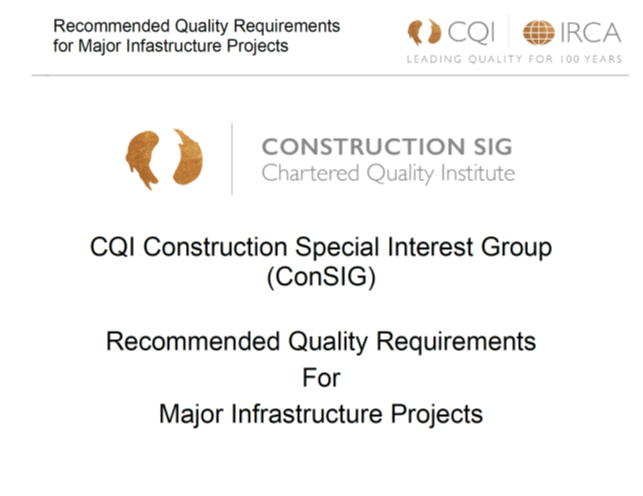
Why are Contract Quality Conditions Important?
Simply put, getting an appropriate set of Contract Quality Conditions (CQCs) in place at the start of a project is, in my experience, essential to the overall success of the project with regard to compliance and certification.
CQCs allow the Client to define their appetite for risk, set out clear and unambiguous rules of engagement, identify the project’s assurance methodology and quality culture and identify the required deliverables for compliance and handover. Most importantly they should clearly define the responsibilities for quality delivery for all project participants.
In light of the above, I worked with the Chartered Quality Institute Construction Special Interest Group, ConSig for short, of which I am a founder and Steering Committee member, to establish a working group to focus on this subject.
I identified and led a team of experienced construction quality professionals, from both Client and Contractor backgrounds, to produce a best practice set of contract quality conditions aimed initially at major infrastructure projects.
The methodology used was as follows,
• The team used the existing contract quality conditions of current major infrastructure projects as a base and systematically worked through them to identify what we thought was the best combined set of conditions.
• These were then organised to follow the ISO 9001:2015 (Annex SL or L) model. Existing conditions were often found to lack structure and to have duplication and contradictions hidden within them.
• The team then tested our proposed set of conditions against the various quality failures we had experienced to establish whether our clauses, if implemented properly, would help avoid them in future.
The output of this group, “Recommended Quality Requirements for Major Infrastructure Projects”, is approved for use by the CQI ConSig and is available on the ConSig website. www.consig.org
This document has been produced for use on high risk complex projects where the Client has a low risk appetite, i.e. who wants to keep a high level of control/intervention and is prepared to resource it in terms of people and programme. These conditions are therefore not directly appropriate to all projects and must be reviewed and edited to suit each project/contract type.
For further information or advice on how to compile and implement contract quality requirements, please contact me via my LinkedIn page or my website, www.elliotconsultancyservices.co.uk
